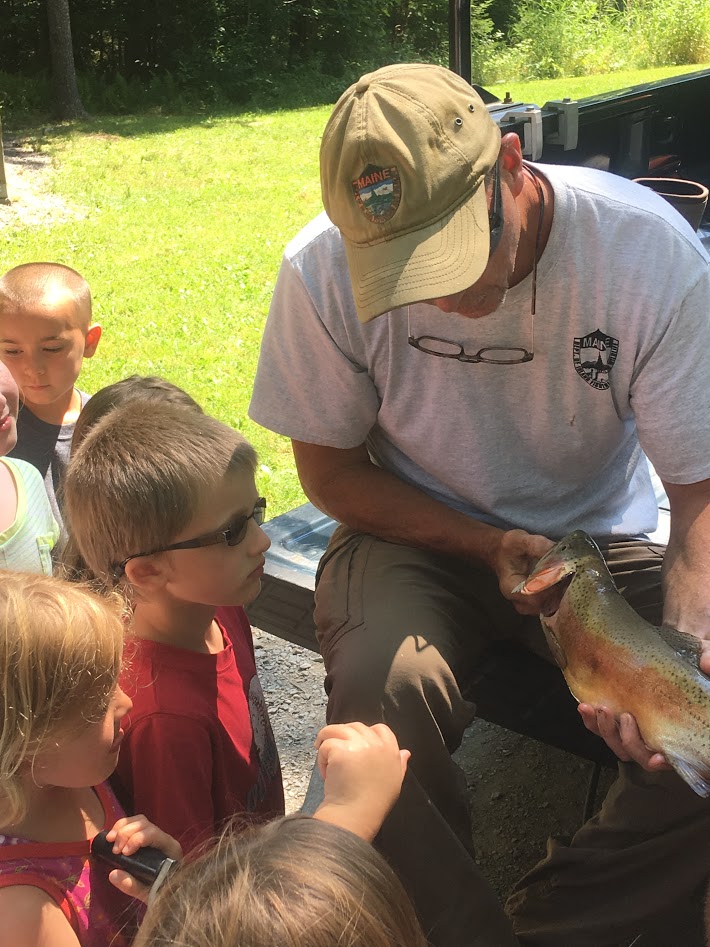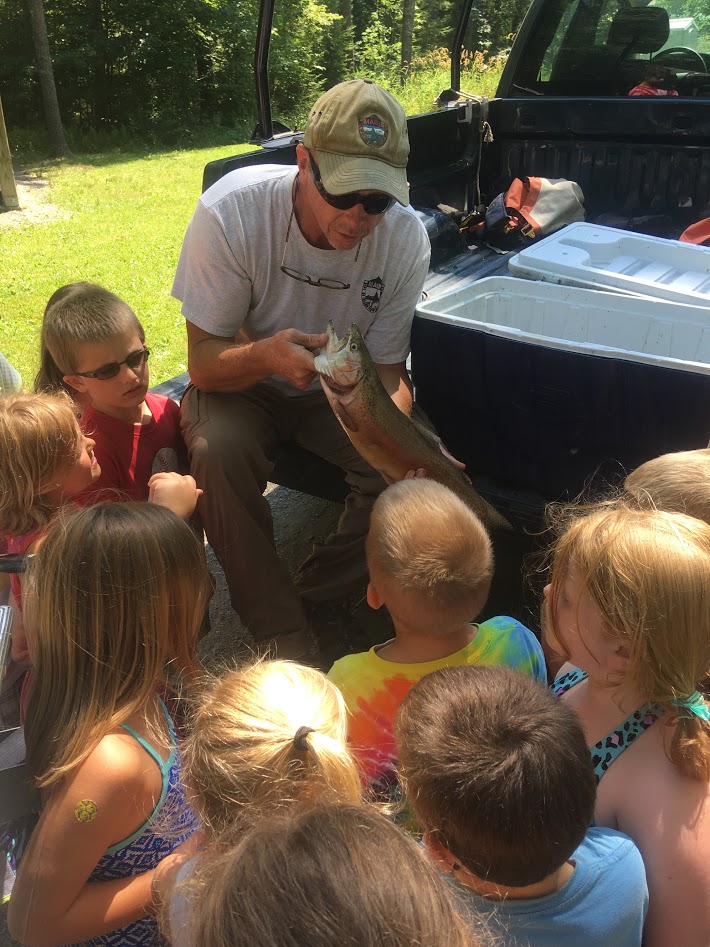August 4, 2017 at 3:44 pm
[caption id="attachment_2442" align="alignright" width="317"] IFW Fisheries Assistant Tom Barrows shows some campers a rainbow trout and how to indentify them.[/caption]
By IFW Fisheries Biologist Jason Seiders
IFW biologists in central and midcoast Maine depend on stocking programs to create trout fishing opportunities for our anglers. We regularly evaluate these programs to ensure that the stocked fish are providing a suitable recreational fishery, which typically means assessing trout survival and growth. These periodic surveys ensure the best possible use of our valuable and limited resources.
Summer pond surveys give us a snapshot of what’s happening in a lake or pond. Our biologists assess water quality in the pond to determine if the water provides suitable habitat for trout (trout need cold water that’s well oxygenated), and we collect a sample of the fish to assess their overall condition.
All fish collected are given a thorough examination to determine length, weight, age, and feeding habits. This information tells us whether fish are surviving during the hot summer months, how quickly they’re growing, and if our stocking numbers need to be adjusted (more fish or less fish). Since we need to dissect the fish to determine what they’re eating, the sampling is lethal to the fish. Rest assured that only a small sample of the fish population is caught during the survey, ensuring plenty of fish for anglers to enjoy.
[caption id="attachment_2441" align="alignleft" width="326"]
IFW Fisheries Assistant Tom Barrows shows some campers a rainbow trout and how to indentify them.[/caption]
By IFW Fisheries Biologist Jason Seiders
IFW biologists in central and midcoast Maine depend on stocking programs to create trout fishing opportunities for our anglers. We regularly evaluate these programs to ensure that the stocked fish are providing a suitable recreational fishery, which typically means assessing trout survival and growth. These periodic surveys ensure the best possible use of our valuable and limited resources.
Summer pond surveys give us a snapshot of what’s happening in a lake or pond. Our biologists assess water quality in the pond to determine if the water provides suitable habitat for trout (trout need cold water that’s well oxygenated), and we collect a sample of the fish to assess their overall condition.
All fish collected are given a thorough examination to determine length, weight, age, and feeding habits. This information tells us whether fish are surviving during the hot summer months, how quickly they’re growing, and if our stocking numbers need to be adjusted (more fish or less fish). Since we need to dissect the fish to determine what they’re eating, the sampling is lethal to the fish. Rest assured that only a small sample of the fish population is caught during the survey, ensuring plenty of fish for anglers to enjoy.
[caption id="attachment_2441" align="alignleft" width="326"] IFW Fisheries Assistant Tom Barrows shows a group of campers a rainbow trout from Knickerbocker Pond.[/caption]
The Region B fisheries staff recently surveyed Knickerbocker Pond in Boothbay. We found that rainbow trout are surviving to older ages and are growing to larger sizes, and brook trout are also surviving multiple years which is creating a great local fishery. Due to water temperatures and dissolved oxygen levels, water quality in Knickerbocker is on the edge for brook trout survival, so finding these older age brook trout was a pleasant surprise.
After conducting the survey, our biologists took some of the fish to the nearby YMCA camp, where they conducted a discussion about Maine’s fisheries and fish biology with some eager campers. The kids were very excited to see the different types of fish that inhabit the pond, and they were amazed at the size of some of these fish! After a day of collecting valuable fisheries data, the opportunity to provide a hands-on learning experience about Maine’s fisheries to a group of kids was an added bonus.
IFW Fisheries Assistant Tom Barrows shows a group of campers a rainbow trout from Knickerbocker Pond.[/caption]
The Region B fisheries staff recently surveyed Knickerbocker Pond in Boothbay. We found that rainbow trout are surviving to older ages and are growing to larger sizes, and brook trout are also surviving multiple years which is creating a great local fishery. Due to water temperatures and dissolved oxygen levels, water quality in Knickerbocker is on the edge for brook trout survival, so finding these older age brook trout was a pleasant surprise.
After conducting the survey, our biologists took some of the fish to the nearby YMCA camp, where they conducted a discussion about Maine’s fisheries and fish biology with some eager campers. The kids were very excited to see the different types of fish that inhabit the pond, and they were amazed at the size of some of these fish! After a day of collecting valuable fisheries data, the opportunity to provide a hands-on learning experience about Maine’s fisheries to a group of kids was an added bonus.
 IFW Fisheries Assistant Tom Barrows shows some campers a rainbow trout and how to indentify them.[/caption]
By IFW Fisheries Biologist Jason Seiders
IFW biologists in central and midcoast Maine depend on stocking programs to create trout fishing opportunities for our anglers. We regularly evaluate these programs to ensure that the stocked fish are providing a suitable recreational fishery, which typically means assessing trout survival and growth. These periodic surveys ensure the best possible use of our valuable and limited resources.
Summer pond surveys give us a snapshot of what’s happening in a lake or pond. Our biologists assess water quality in the pond to determine if the water provides suitable habitat for trout (trout need cold water that’s well oxygenated), and we collect a sample of the fish to assess their overall condition.
All fish collected are given a thorough examination to determine length, weight, age, and feeding habits. This information tells us whether fish are surviving during the hot summer months, how quickly they’re growing, and if our stocking numbers need to be adjusted (more fish or less fish). Since we need to dissect the fish to determine what they’re eating, the sampling is lethal to the fish. Rest assured that only a small sample of the fish population is caught during the survey, ensuring plenty of fish for anglers to enjoy.
[caption id="attachment_2441" align="alignleft" width="326"]
IFW Fisheries Assistant Tom Barrows shows some campers a rainbow trout and how to indentify them.[/caption]
By IFW Fisheries Biologist Jason Seiders
IFW biologists in central and midcoast Maine depend on stocking programs to create trout fishing opportunities for our anglers. We regularly evaluate these programs to ensure that the stocked fish are providing a suitable recreational fishery, which typically means assessing trout survival and growth. These periodic surveys ensure the best possible use of our valuable and limited resources.
Summer pond surveys give us a snapshot of what’s happening in a lake or pond. Our biologists assess water quality in the pond to determine if the water provides suitable habitat for trout (trout need cold water that’s well oxygenated), and we collect a sample of the fish to assess their overall condition.
All fish collected are given a thorough examination to determine length, weight, age, and feeding habits. This information tells us whether fish are surviving during the hot summer months, how quickly they’re growing, and if our stocking numbers need to be adjusted (more fish or less fish). Since we need to dissect the fish to determine what they’re eating, the sampling is lethal to the fish. Rest assured that only a small sample of the fish population is caught during the survey, ensuring plenty of fish for anglers to enjoy.
[caption id="attachment_2441" align="alignleft" width="326"] IFW Fisheries Assistant Tom Barrows shows a group of campers a rainbow trout from Knickerbocker Pond.[/caption]
The Region B fisheries staff recently surveyed Knickerbocker Pond in Boothbay. We found that rainbow trout are surviving to older ages and are growing to larger sizes, and brook trout are also surviving multiple years which is creating a great local fishery. Due to water temperatures and dissolved oxygen levels, water quality in Knickerbocker is on the edge for brook trout survival, so finding these older age brook trout was a pleasant surprise.
After conducting the survey, our biologists took some of the fish to the nearby YMCA camp, where they conducted a discussion about Maine’s fisheries and fish biology with some eager campers. The kids were very excited to see the different types of fish that inhabit the pond, and they were amazed at the size of some of these fish! After a day of collecting valuable fisheries data, the opportunity to provide a hands-on learning experience about Maine’s fisheries to a group of kids was an added bonus.
IFW Fisheries Assistant Tom Barrows shows a group of campers a rainbow trout from Knickerbocker Pond.[/caption]
The Region B fisheries staff recently surveyed Knickerbocker Pond in Boothbay. We found that rainbow trout are surviving to older ages and are growing to larger sizes, and brook trout are also surviving multiple years which is creating a great local fishery. Due to water temperatures and dissolved oxygen levels, water quality in Knickerbocker is on the edge for brook trout survival, so finding these older age brook trout was a pleasant surprise.
After conducting the survey, our biologists took some of the fish to the nearby YMCA camp, where they conducted a discussion about Maine’s fisheries and fish biology with some eager campers. The kids were very excited to see the different types of fish that inhabit the pond, and they were amazed at the size of some of these fish! After a day of collecting valuable fisheries data, the opportunity to provide a hands-on learning experience about Maine’s fisheries to a group of kids was an added bonus.Categories